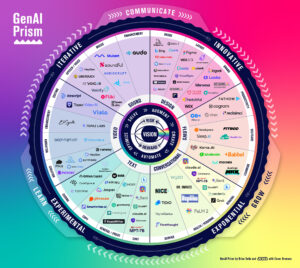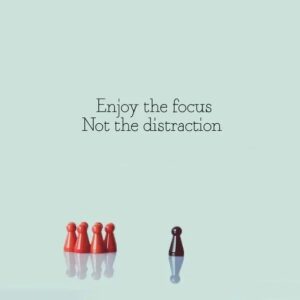
Part 11 in a series introducing my new book, The End of Business as Usual…this series serves as the book’s prequel.
There are those who believe social media is the catalyst for a new genre of business and that it will ultimately change how companies engage with customers. Others believe that for the organization to truly matter, it must adopt a culture of customer and employee centricity. Then there are those who study the evolution of consumer behavior and market shifts to develop informed strategies for the business overall and in some cases, demonstrate the need for organizational transformation. To successfully compete for the future, you must unite these internal fronts and lead a concerted effort for meaningful change.
Social Media +
Customer service and employee empowerment +
Insights +
The development of compelling experiences through product and engagement =
A holistic approach
We must realize that no matter how successful we are today, we can always improve how we compete for equal or greater revenue and attention tomorrow. Your goal within the organization is to create a special taskforce to bring about change, shift the culture to recognize unforeseen opportunities, and bring together previously disparate decision makers to create and steer positive customer experiences. Sounds easy right? Unfortunately, none of this is easy, but nevertheless, it is important to help your organization adapt in the face of a shifting business landscape.
People See One Brand, Not Departments or Functions
The conversation about the future of business is bigger than social media. Yet, when we look at the top three departments that are responsible for social media within the organization today, marketing, marketing communications, and public relations essentially own social media. Critical functions such as product development, customer service, HR, finance, are all but absent. Here we are at the beginning of the end of business as usual and the champion of change, social media, is already a silo in the very organization it sought to transform and unify. That’s why your role cannot simply be relegated to social media anything. You are a change agent and your mission is to use the tools and channels necessary to help make your business, your story, your mission and vision, relevant in a new era of consumerism.
Booz & Co. and Buddy Media recently published a report that documents the migration from “Campaigns to Capabilities” and highlights how businesses are thinking beyond the campaign, viral video or Tweet to find the true meaning of Like. What struck me about this report is that it is among the first to show that departments outside of marketing are starting to embrace the social nature of Facebook, Twitter, YouTube and Blogs (the top four social platforms). Here we can see that customer service, research, sales, and product development are increasing adoption until one day, social media will be equally distributed across the organization as an extension of a more customer and employee centric approach.

Change requires support and in the world of business, that support will come from an executive sponsor. However, it is up to you to convince an executive who is willing to take a risk on you and your vision to internally promote the need for transformation. In this report, one-third of companies have a senior executive who is responsible for social media company-wide. That still leaves 65% of businesses that are operating without the benefit of senior leadership or involvement. As a wise executive told me for the new book, “If you come to me with a request for budget and resources for social media, you will lose. If you demonstrate how social media aligns with our business objectives and how it will play a role in helping us achieve our goals, then you will win every time.”

The study surfaced an interesting range of critical success enablers. I wanted to focus on a few that are instrumental in leading the transformation of what is becoming a social brand to a far more important state of a social business. The resounding theme here is developing an adaptive framework and creating a culture of change to unite the organization around a holistic approach.
– The ability to react quickly
– Education on what can be achieved via social media
– A culture that encourages experimentation
– Training
– Unique content that is exclusive to the audience of each

The report articulates a substantive data point in that almost 40% of businesses polled state that social media is a CEO-level agenda item. The question here is, to what extent is social media appreciated at the top? Is it another means to broadcast messages? Is social media a channel to reach the Millennial?
This is why we must revisit the first paragraph of this section to clearly communicate what’s possible in these as well as other disruptive channels. It’s about customer relationships. It’s about creating meaningful and shareable experiences. The rest is just technology. What you place in these channels says everything about how your business views and appreciates your customers and your work will me measured and judged as such.

As you can see, the examples of use cases mirror those departments that own social media today. However, beyond marketing, we can see that customer service, market research, sales, product development and also employee engagement are showing strong examples of what’s possible.

Survival of the Fittest Fitting
What lies ahead is nothing short of digital Darwinism, the evolution of consumer behavior when society and technology evolve faster than the ability to adapt. While money is the lifeblood of the economy that makes the world go round, in the egosystem, where people are at the center of their individual online experience, attention is the new economy. This isn’t just about survival of the fittest, but instead, survival of the fitting.
To foster meaningful relationships and lure the attention of the increasingly distracted consumer, requires so much more than a Twitter or Facebook presence. The future of business is co-created and therefore is driven by the mindful creation of shared experiences. Those experiences must be designed, reinforced, and shaped over time. Marketing alone cannot trigger shared experiences and convert them into sales or customer loyalty. Retention, engagement, and empowerment must touch customers and employees and in order to do, the entire organization must #AdaptorDie.
Order The End of Business as Usual today…
Part 1 – Digital Darwinism, Who’s Next
Part 2 – Social Media’s Impending Flood of Customer Unlikes and Unfollows
Part 3 – Social Media Customer Service is a Failure!
Part 4 – I think we need some time apart, it’s not me, it’s you
Part 5 – We are the 5th P: People
Part 6 – The State of Social Media 2011: Social is the new normal
Part 7 – I like you, but not in that way
Part 8 – Are You Building a Social Brand or a Social Business?
Part 9 – CMO’s are at the Crossroads of Customer Transactions and Engagement
Part 10 – From Social Commerce to Syndicated Commerce
Image credit: Shutterstock






Brian what I had stand out for me as I read this incredibly thoughtful and detailed post ( a great mix of data and visuals for my brain to absorb) was two things:
“The resounding theme here is developing an adaptive framework and creating a culture of change to unite the organization around a holistic approach”ANDa compliment paid to me by Trey Pennington-he said “Michele you have the rare gift of attention and this will serve you well”.What do you think it will take for businesses to recognize when they combine the gift of attention from a holistic mindset, they will then be able to connect with their potential and current customers in a way that create a more profitable relationship?
Brian.
This post struck me and clarified why while I am very drawn to your perspective, there is a fundamental difference between out thinking.
I believe that tools and platforms become successful when they naturally are expressions for human behavior. The tools, from my perspective, are not ahead of the behaviors, they are not the drivers, but the recipient. Did Facebook invent ‘sharing’ or did the platform capture the pent up need of the mass market?
And when I think of your term ‘Digital Darwanism’ I see this applying to businesses not the market place itself. To the companies and to a gulf between a culture that has already moved on beyond old school business practices and corporations that are fixated on understanding tools, rather than understanding the needs of their customers.
My sense is that there has been a market shift. The social web offers a platform for companies and brands to meet the new marketplace. Understanding the platform is important but less important than understanding the market.
Really thoughtful post. Thanks!
Actually…we’re right in line with our views. Your comment is essentially the foundation of the post. Here’s an oldie but a goodie! https://www.briansolis.com/2007/08/social-media-is-about-sociology-not/
Thanks Brian
I’m new to your blog but a career-long builder of commerce-based communities, starting with BBS systems.There seems to be too much embracing of the tools and the machines these days, so it is good to find a kindred thinker.
BTW…reading your new book.
Thank you also for reading the book…look forward to your thoughts.
Actually…we’re right in line with our views. Your comment is essentially the foundation of the post. Here’s an oldie but a goodie! https://www.briansolis.com/2007/08/social-media-is-about-sociology-not/
Brian
I agree with your summary that CEO’s need to be the ones to push for a taskforce with the special mission of identifying new opportunities via social media. This must be a part of the leadership’s vision if it’s to be successful. Too often, social media is pushed up from the bottom by people who have the extra time to embrace it. It has not been considered as part of the overall strategy but I think that is about to change . . .
Absolutely…sometimes it takes the help of those who can see the bigger picture to take the value and promise of new opportunities to those who can act on it.
Thanks really informative!
I am getting excited about your new book! This is an excellent look at business in the 21st century with so many modes of communication between consumer and company.
Thank you Elise. I really hope you enjoy it!
I love the Title of your book..when the Title is so impressive I can assume how good would be book..I will buy it soon..Thanks!
Brian, I continue to enjoy reading your posts and they always give me insights on new ideas. People tend to treat social media as a task for employees who are more towards the bottom of their careers. However, social media is an essential key to a businesses success. I believe everyone in a business should be fully aware of what social media their company is using, how to use it and have a top executive in charge. Social media is a simple way for businesses to communicate with its customers. If a business has a new product or service coming out, all it needs to do is tweet or send a Facebook post to get the word out fast and let the word-of-mouth marketing take over. If everyone does not know all the aspects of social media and how to correctly use it, one wrong tweet could permanently damage a company’s repuation.
Absolutely…thank you for coming back to read and also comment.
Great its a great article which give us useful advice.i like it.Mostly i like your title you can’t go back and create a new beginning but u can change your ending.really its true.
To successfully compete for the future, you must unite these internal fronts and lead a concerted effort for meaningful change.